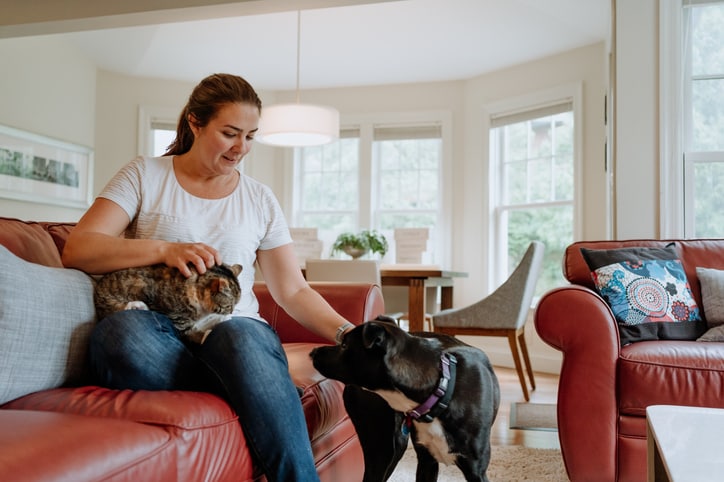If you’re like most pet owners, nothing is too good for your four-legged, finned or flapping friend. But when it comes to pet care options, there are many, which can incite decision fatigue fast. Should you board your furry friend or get a pet sitter? Do you need a trainer? Groomer?
“Pets, just like families, are unique individuals with their own set of needs,” says Nicole Kohanski, founder of Wiggle Butt Academy, a Texas-based dog behavior and training company. “For instance, a German Shepherd dog may require more training, people socialization and mental stimulation games to keep them happy and healthy. On the other hand, a dog-social doodle may require some playdates at a daycare, a skilled groomer and lots of walks to be happy.” Put another way: There’s no one-size-fits-all pet care protocol.
From dog walkers to pet groomers and more, read on to see our complete list of pet care options, along with expert input for each.
A comparison of pet care options
Check out our table below, which easily lays out types of pet care services, along with what to consider.
| Pet care option | Best for | Considerations |
|---|---|---|
| Dog walker | • Dogs who require a lot of exercise or stimulation. • Anxious or special needs pets. • Pet parents who want individualized care. | • More expensive than dog daycare. • Less availability than dog daycare. • May not have backup. • Need to make sure walker is insured and check references. |
| Pet sitter | • Anxious or special needs pets. • Pet parents who want individualized care. | • More expensive than boarding.Less availability than boarding. • Tighter cancelation policies than boarding. • May not have backup. • Need to make sure sitter is insured and check references. |
| Dog daycare | • Friendly, non-aggressive dogs. • Getting in socialization and exercise. | • Potential for altercations, especially if there are a large number of animals. |
| Pet boarding | • Friendly, non-aggressive dogs. • Getting in socialization and exercise. | • Potential for altercations, especially if there are a large number of animals. • If boarding at vet or kennel, not many opportunities for exercise / they may sleep in a crate. |
| Veterinarian | • Maintaining your pet’s everyday health. • Handling health issues, big and small. | • Expensive, so pet insurance may be beneficial. |
| Animal behavior trainer | • Stress reduction for owners. • Improves obedience and skills. | • Can be expensive, depending on services. |
| Groomer | • Helping maintain pet health and hygiene. | • Can be expensive, depending on services. |
1. Dog walker
Find a dog walker
Just as their title suggests, dog walkers come to your home — generally while you’re working — to take your pup for a stroll, some stimulation and maybe socialization. Each dog walker is unique in how they operate — some walk a group of dogs at once and some take the dogs to a dog park — so honing in on the type of service you think would be best for your dog is key.
“In-home pet care, such as a dog walker, can be far more comfortable for most pets than traveling or staying elsewhere,” explains Jennifer Malawey, dog trainer and behavior consultant at Instinct Dog Behavior and Training Portland. “This is especially true for animals who are more sensitive or prone to anxiety.”
Benefits:
- Convenient.
- Consistent.
- Personalized at-home care.
- Ideal for dogs who require a lot of daily exercise, as well as for anxious dogs or pups with special needs.
Cost: $15.32 an hour is the national average, as of May 15, 2024, according to Care’s Cost of Care Calculator. Keep in mind, though, this rate can vary quite a bit, based on location, needs and more.
2. Pet sitter
Find a pet sitter
Find a dog sitter
Find a cat sitter
Find a bird sitter
Find in-home pet care
Pet sitters are professionals who care for your pet(s) when you’re away. This can mean they’re walking or playing with your dog, cleaning your cat’s litter box or feeding the fish. Pet sitters provide personalized care for your pet per your instruction.
In many cases, pet sitters come to your home — but not always. “Many dog sitters provide services in their home, in smaller groups, which can be more comfortable than the option of a large and noisy facility,” Malawey says. “This can be a good approximation to staying at home.”
Also, keep in mind, the majority of in-home (yours or theirs) pet care providers are self-employed. “Always check that they are insured and have references,” Malawey notes. “Also, show your appreciation! It’s a tough job, and when you find someone you trust, you want them to stick around.”
Benefits:
- Convenient.
- Consistent.
- Personalized at-home care.
- Ideal for anxious animals or those with special needs.
- Potential opportunity to tack on additional tasks, such as house sitting.
Cost: $14.69 an hour is the national average, as of May 15, 2024, according to Care’s Cost of Care Calculator. Keep in mind, though, this rate can vary, based on pet, size, location, needs, potential additional duties and more.
Join Care for free
3. Dog daycare
Find dog daycare
Dog daycare, simply put, is daytime care for dogs, in which you drop your pet at a facility for short-term care. Owners of particularly friendly and active dogs, Malawey notes, may prefer this option to dog walking. “For dogs who are very social and enjoy the company of other unfamiliar dogs, daycare can offer a wonderful opportunity to play and mingle,” she says.
Under the supervision of trained staff members, dogs have the opportunity to run around inside the facility and play with other dogs, as well as outdoors in a fenced area. Typically, there’s time for napping and rest, as well.
Before signing your dog up for daycare, “check that dogs are separated into appropriate groups, based on size, temperament and play style,” Malawey says. “This goes a long way toward protecting all the pets.”
Benefits:
- Opportunities for exercise.
- Opportunities for socialization.
- Generally, lots of availability.
- Often more affordable than individualized care.
Cost: Cost varies by location, as well as facility size. “Volume businesses, rather than individual or small group services, can offer lower prices and have more availability,” says Malawey. At The Barker Lounge in Cranford, New Jersey, a full day of care (7 a.m. to 7 p.m.) is $40 per dog. At Four Paws Only in Lakeland, Florida, a full day is $22.
4. Pet boarding
Find pet boarding
Find dog boarding
Find cat boarding
Find dog boarding kennels
In general, pet boarding (sometimes referred to as a kennel or kenneling) refers to a pet care option provided by a facility or pet caregiver, in which you can temporarily leave your pets in a safe, supervised environment while you are away. This service also includes food and general care as needed, and depending on the facility or carer, may also include exercise and socialization for the pets.
In fact, many dog daycares offer overnight or longer-term boarding services. When dogs board at a dog daycare center, they generally have a large, individual area where they sleep and eat their meals. During the day, they have opportunities to play, exercise and go to the bathroom.
All this being said, it’s important to gauge your dog’s disposition before signing them up for boarding (or even daycare) with other animals. “Be quite sure that your dog actually does enjoy spending time around other dogs,” Malawey says. “A great many dogs prefer to spend time around only a select group of familiar dog friends or to avoid other dogs. If you’re not sure, talk to a trusted dog professional.”
Boarding is also available for cats, where there are opportunities for playing, climbing and eating.
Before boarding your pet, visit the facility or home where your pet will stay, ask about staff or carer qualifications, vaccination requirements, and hourly or daily care plans. Some facilities only offer basic care and a crate to sleep in, which might work in between appointments, for short stays, or in a pinch but isn’t ideal for longer-term care needs. That said, many vets offer kennels for exotic animals, such as birds, lizards and even rabbits.
Benefits of pet boarding facilities:
- Safe supervision and care while you are away.
- Opportunities for exercise.
- Opportunities for socialization.
- Generally, lots of availability.
- Often more affordable than individualized care.
Cost: Cost varies by location and facility. Using the facilities from above again, The Barker Lounge charges $65 per night (including daycare) per dog, and Four Paws Only charges by the size of the dog. For instance, dogs 1-27 pounds are $27 per night, where dogs 90 pounds and up are $31 per night. Cats are $20 per night.
5. Veterinarian
Every pet owner needs a vet — a.k.a. a primary doctor. “Taking your pet to the vet each year is essential for their lifelong health and well-being,” notes Dr. Nicole Savageau, a veterinarian with The Vets. “These annual check-ups serve as preventive measures, allowing the early detection of potential health issues and ensuring that your pet receives timely vaccinations to safeguard against common diseases.”
“Regular veterinary visits also provide an opportunity to address dietary and nutritional needs, maintain dental health, and monitor growth and behavior,” Savageau continues. “Ultimately, these routine visits form the foundation for a healthy and happy life for your pet, emphasizing the importance of proactive and responsible pet ownership.”
Benefits:
- Promotes a healthy lifestyle.
- Offers preventative care.
- Vaccination administration.
- Great source of information, recommendations, resources, etc.
Cost: Depending on what your pet is going to the vet for, prices will vary. That said, vet visits — and the potential medications, surgeries, etc. that accompany them — aren’t cheap, so you may want to consider pet insurance.
6. Animal behavior trainer
Find a pet trainer
Find a dog trainer
Find a cat trainer
Find a therapy dog trainer
An animal trainer works with your pet to promote obedience and/or perfect certain skills — some will even help with potty training. They either come to your home or work out of a facility or even from their own home.
While trainers can feel like a luxury to some, Kohanski notes that they can be a key component of a pet’s overall care team — particularly when it comes to dogs. “A cohesive team,” she notes, “can make sure owning a dog is a happy and fulfilling experience instead of a point of stress.”
Benefits:
- Stress reduction.
- Better relationship with your pet.
- Personalized plan.
- Convenient.
Cost: $15.17 an hour is the national average, as of May 15, 2024, according to Care’s Cost of Care Calculator. Again, though, depending on needs, pet and location, the rate will vary.
7. Groomer
Find a pet groomer
Find a dog groomer
Find a cat groomer
Groomers make sure your dog or cat’s fur stays fresh, clean, cut, styled and pest-free. You can specify what services you’d like to have done, but in addition to getting a haircut, dogs often get their nails trimmed, too. Cute!
Benefits:
- Prevents fur from getting matted.
- Prevents nails from getting too long and/or ingrown.
- Flea and tick check.
- They’ll look adorable and smell great!
Cost: $15.40 an hour is the national average, as of May 15, 2024, according to Care’s Cost of Care Calculator. Keep in mind, though, most dogs spend a few hours at the groomer, and there are a number of variables that will affect the cost, including services, location and dog size.

